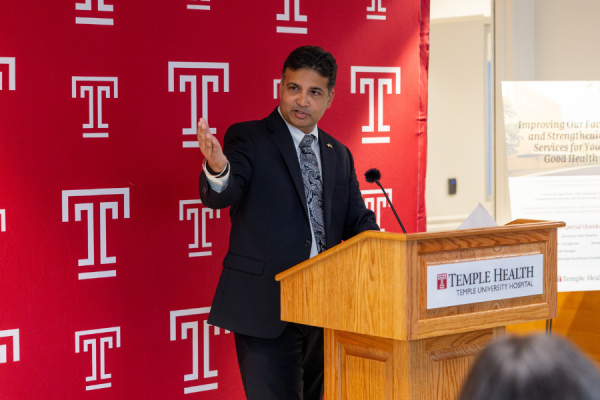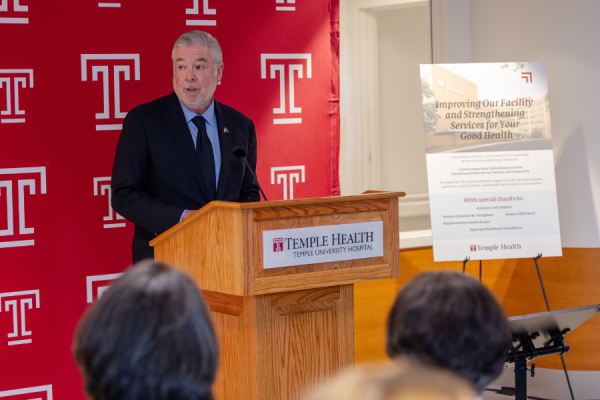“This is a place of healing, of connection, and of hope,” said Abhi Rastogi, MBA, MIS, Executive Vice President of Temple Health and President & CEO of Temple University Hospital, Inc. at our May 15th ribbon cutting and appreciation event to celebrate $3 million in Commonwealth capital funding and a generous gift from the Episcopal Healthcare Foundation for Temple University Hospital (TUH) - Episcopal Campus’ new Crisis Response Center.
Our Crisis Response Center is a 24-hour psychiatric emergency service where individuals experiencing behavioral health crises receive evaluation, treatment, and referrals for additional care. Its skilled team of psychiatrists, psychiatry residents, psychiatric nurses, crisis response technicians, certified recovery specialists, and social workers treat more than 12,000 patients each year, making it the busiest Crisis Response Center in Philadelphia.
To address our community’s increasing need for behavioral health services, we used these funds to expand the Crisis Response Center from approximately 4,400 square feet to more than 14,000 square feet—tripling its size. Thanks to Commonwealth capital funding, Episcopal Campus was also able to open a licensed outpatient Substance Use Disorder Clinic that treats patients with both addiction and behavioral health diagnoses and offers coordinated certified recovery specialist support and flexible walk-in hours with no appointment necessary.
“When patients arrive here, they are often in acute crisis,” said Rastogi. “And when patients are treated here, it is with medical precision and humanity, because we believe that care must come with compassion. We set the bar for crisis care in the city—and today, we raise it even higher.”
Invaluable Support from Commonwealth and Philanthropic Partners
TUH-Episcopal Campus’ Executive Director, John Robison, shared his gratitude for the partners who made this project possible.
“None of this would have happened without our solid partnership with the Commonwealth and the Episcopal Healthcare Foundation, which contributed significant philanthropic funding,” Robison said. “You share our deep commitment to the patients we serve—individuals and families who turn to us in their time of need—and your support is making a meaningful, lasting difference in their lives.”
“The Episcopal Healthcare Foundation was proud to make this investment in the future of this campus,” said Joseph W. “Chip” Marshall III, Episcopal Healthcare Foundation and Temple Health board member. “We have long been, and remain, deeply committed, to this campus and the community it serves. It is incredibly rewarding to see the meaningful impact our gift has made, and we are honored to support the continued growth and excellence of care here.”
“Leading with Empathy”
Valerie Arkoosh, MD, MPH, Secretary of the Pennsylvania Department of Human Services, thanked Temple Health for our commitment to “doing the difficult work” and “stepping up again” for our community.
“This is providing the help our neighborhoods need,” agreed State Representative Danilo Burgos. “I grew up down the block from here, and I’m proud to serve the community I’m from. To the men and women who will be running this center, thank you for leading with empathy and taking care of our most vulnerable population. And thank you to Temple Health, which is the best in the state of Pennsylvania.”
“One in five Pennsylvanians live with a mental illness,” noted State Senator Christine Tartaglione. “Yet for too long, we’ve underinvested in the systems meant to help. This project is a step in the right direction. It represents the kind of future we should be working towards: where care is accessible and no one is left to struggle alone.”
A Space for Healing and Humanity
Many of the speakers also emphasized the quality of the renovations, which have transformed the Crisis Response Center into a bright, open, and spacious facility.
“Space matters,” said Temple University President John Fry. “There’s dignity here, and that’s an act of humanity.”

